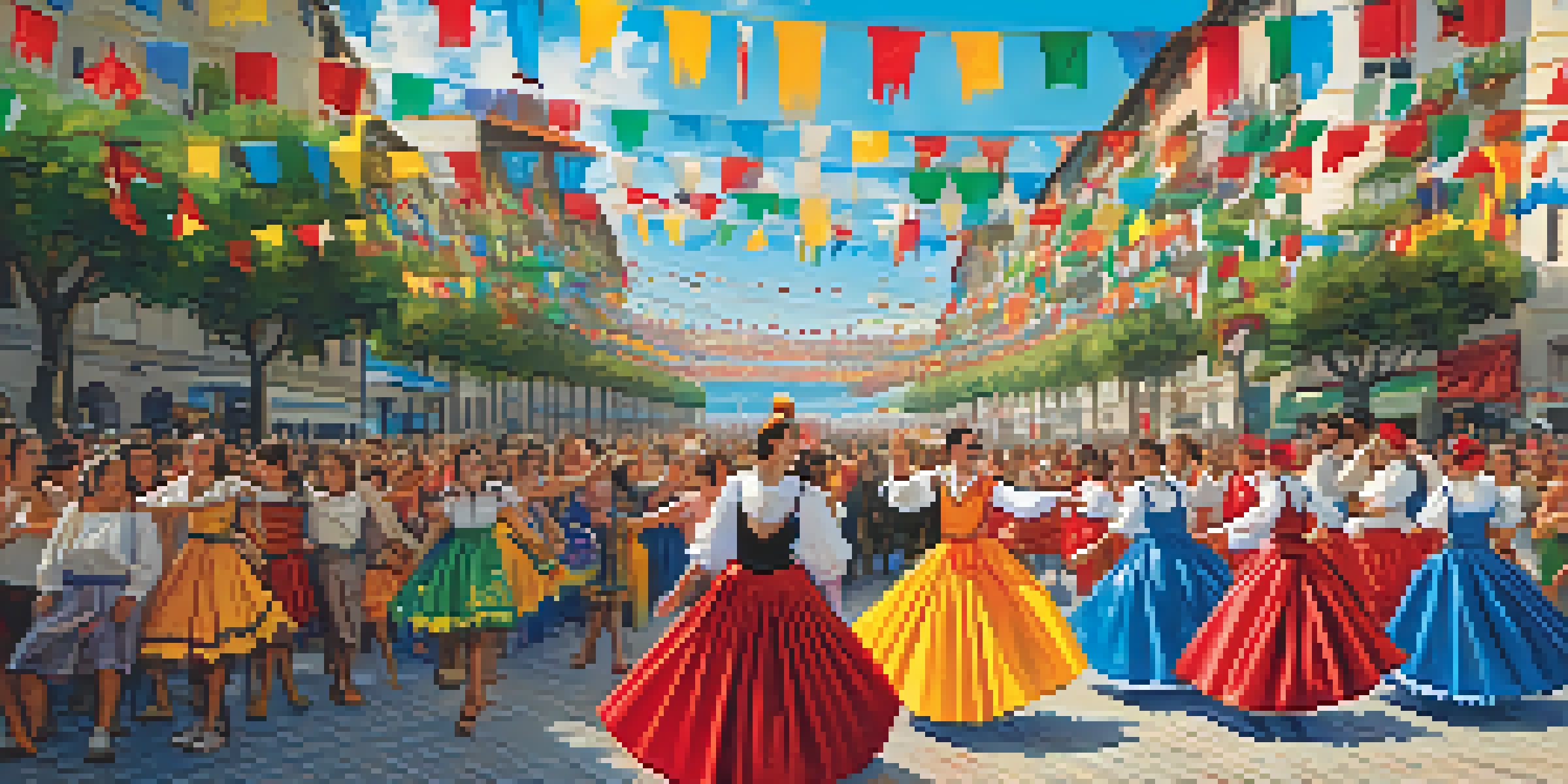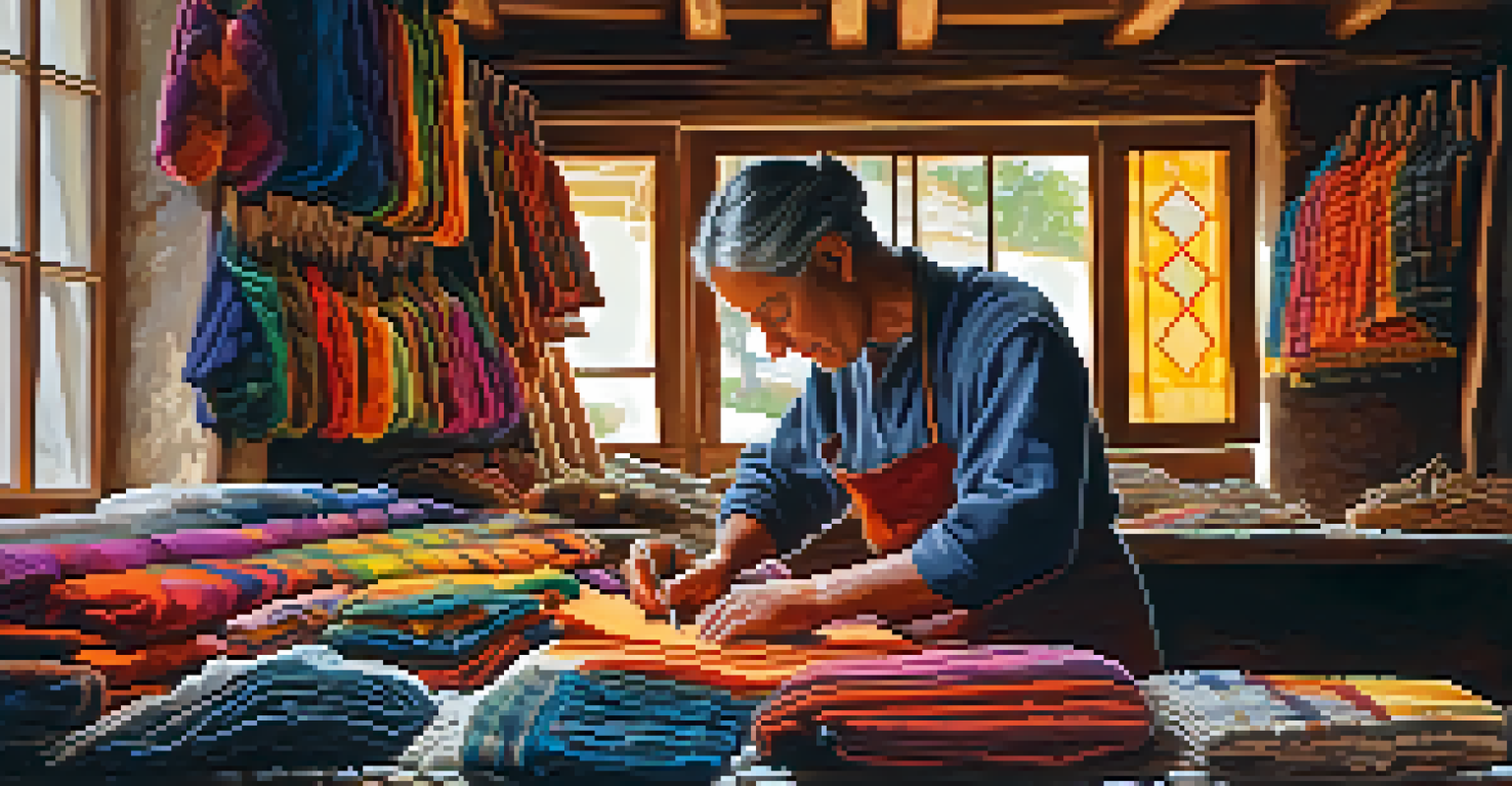The Rich Tapestry of Spain's Indigenous Cultures and Heritage

An Overview of Spain's Indigenous Peoples
Spain is home to a diverse array of indigenous cultures, each with its unique traditions and histories. From the Basques in the north to the indigenous groups in the Canary Islands, these communities add rich layers to Spain's cultural landscape. Their distinct languages, art forms, and practices reflect centuries of resilience and adaptation to changing environments.
A people without the knowledge of their past history, origin and culture is like a tree without roots.
These groups often share a deep connection to their land, which shapes their cultural identity. For instance, the Basques have a strong maritime tradition, while the indigenous peoples of the Canary Islands have developed unique agricultural techniques suited to their island ecosystems. Each community's lifestyle offers a window into the intricate relationship between culture and geography.
Understanding these indigenous cultures helps us appreciate Spain's multifaceted identity. By recognizing the contributions of these communities, we can foster greater respect and awareness of their ongoing challenges and achievements in modern society.
Language: The Heart of Indigenous Identity
Language serves as a crucial element of cultural identity among Spain's indigenous peoples. Many communities, such as the Basques, speak their unique languages—Euskara, which is distinct from Spanish and other Romance languages. This linguistic diversity illustrates the rich cultural history and the importance of preserving these languages for future generations.

The revival of indigenous languages is a vital part of cultural preservation efforts. Schools and community programs are increasingly offering courses in these languages, empowering younger generations to reconnect with their heritage. This linguistic revival not only fosters a sense of pride but also strengthens the community's cultural ties.
Cultural Diversity Enriches Spain
Spain's indigenous cultures, from the Basques to the Canary Islanders, contribute unique traditions, languages, and histories that enhance the nation's cultural landscape.
Moreover, language acts as a vessel for storytelling and tradition. Through oral histories, songs, and folklore, indigenous languages encapsulate the values and experiences of these peoples, keeping their cultures alive and relevant in today's world.
Festivals: Celebrating Indigenous Heritage
Festivals play a significant role in showcasing the vibrant cultures of Spain’s indigenous communities. Events like the 'Semana Grande' in the Basque Country or the 'Fiesta de San Juan' in Galicia highlight traditional music, dance, and cuisine. These celebrations not only honor their history but also invite outsiders to appreciate their rich cultural expressions.
Culture is the widening of the mind and of the spirit.
During these festivals, indigenous peoples share their customs through engaging activities, such as traditional dances and storytelling sessions. This communal spirit fosters unity and pride within the community while offering visitors a glimpse into their heritage. It’s a beautiful exchange that enriches both the participants and the audience.
Additionally, these festivals are essential for cultural transmission. They provide a platform for younger generations to learn about their customs and practices, ensuring that their heritage remains alive and vibrant for years to come.
Art and Craftsmanship: A Window into Culture
Art and craftsmanship serve as powerful expressions of Spain's indigenous cultures. From traditional pottery to intricate textiles, these art forms tell stories of their creators' lives and histories. Each piece is often imbued with symbolism, reflecting the community's values and beliefs, making them not just decorative items but cultural artifacts.
Many indigenous artisans are committed to preserving traditional techniques passed down through generations. For example, the intricate patterns of Basque berets or the vibrant colors of Galician tapestries reveal a deep connection to their roots. By practicing these crafts, artisans not only keep their heritage alive but also promote sustainable practices through the use of local materials.
Language Preserves Indigenous Identity
The revival of indigenous languages plays a crucial role in cultural preservation, allowing younger generations to reconnect with their heritage and maintain their community's identity.
The appreciation for indigenous art is growing, both locally and internationally. As these artisans gain recognition, they contribute to a broader understanding of Spain’s cultural diversity, fostering respect and admiration for the skills and stories behind their creations.
Cuisine: Tastes of Indigenous Traditions
Cuisine is another vibrant aspect of Spain's indigenous cultures, showcasing the unique flavors and ingredients rooted in their histories. Each indigenous group has its culinary traditions, often utilizing local produce and age-old techniques. For instance, the Basque people are famous for their seafood dishes, which reflect their strong maritime heritage.
Indigenous cooking often involves communal practices, where family and community members gather to prepare meals together. This not only strengthens social bonds but also reinforces cultural identity through shared culinary experiences. Dishes are often passed down through generations, preserving recipes and techniques that are integral to their heritage.
In recent years, there has been a revival of interest in indigenous cuisines, with chefs incorporating traditional ingredients and methods into modern dishes. This fusion celebrates the past while making indigenous food accessible to a broader audience, highlighting the importance of these culinary traditions in Spain's gastronomic landscape.
Challenges Facing Indigenous Communities Today
Despite their rich cultural heritage, Spain's indigenous communities face significant challenges in the modern world. Issues such as globalization, urbanization, and economic pressures threaten their traditional ways of life. Many young people are leaving rural areas for urban centers, leading to a decline in cultural practices and language use.
Moreover, indigenous communities often struggle for recognition and rights within the broader Spanish society. The fight for land rights, cultural preservation, and political representation remains ongoing. These challenges necessitate a collective effort to support and advocate for the rights and needs of these communities.
Challenges Threaten Indigenous Heritage
Modern issues like globalization and urbanization pose significant challenges to Spain's indigenous communities, impacting their traditional ways of life and cultural practices.
However, there is a growing awareness and appreciation for indigenous cultures, which brings hope for the future. Initiatives aimed at promoting cultural education and rights can empower communities, ensuring their rich heritage continues to thrive in an ever-changing world.
The Future of Indigenous Cultures in Spain
Looking ahead, the future of Spain's indigenous cultures is intertwined with the efforts of both the communities and society at large. As awareness grows about the importance of cultural diversity, there is a renewed commitment to preserving these rich traditions. Educational programs and cultural exchanges can foster understanding and appreciation for indigenous peoples.
Many indigenous leaders are actively advocating for their rights and the preservation of their cultures. By engaging with policymakers and broader society, they aim to create sustainable solutions that respect their traditions while addressing contemporary challenges. This proactive approach can pave the way for a more inclusive future.

Ultimately, the resilience and creativity of Spain's indigenous peoples will play a crucial role in shaping their future. By embracing their heritage and adapting to modern realities, they can continue to contribute to Spain's rich cultural tapestry, ensuring that their stories are told for generations to come.